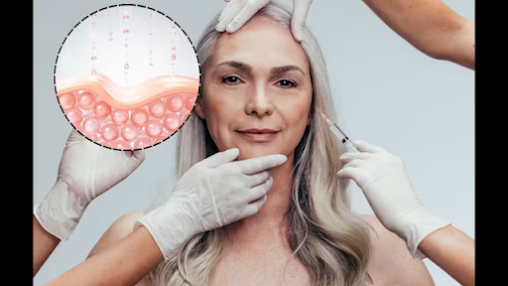Losing hair is a major worry in India,
affecting everyone, young and old alike. Between pollution, inherited hair-loss
traits, and the stresses of everyday life – it’s no wonder many Indians are
battling hair fall today, especially in a country renowned for its deep
cultural roots where long, shiny hair plays an integral part. As we grapple
with modern times, our hair continues to suffer from problems like dirty air
and ever-fluctuating weather conditions that block hair follicles and ruin our
tresses. Adding to this mix is the troubling proposition of losing hair due to
genetic factors. However, there’s still hope.
Steeped in Indian tradition comes an
all-natural, whole-body solution that is yoga or exercise to reduce hair fall.
This time-honored practice appreciates how crucial our overall well-being is to
maintaining healthy locks, championing a fit body, alert mind, and happy soul.
So, let’s delve into how yoga can help to reduce hair fall and can help curb
your hair loss problem by improving blood flow to your scalp, reducing stress
levels, and encouraging a diet beneficial for your crowning glory. With yoga to
the rescue, you’ve got a potent weapon against losing hair and the secret sauce
to regaining your lush mane.
Understanding Hair Fall
Hair fall is a common worry for many in India,
and it’s a complex issue with various underlying causes. Stress is a big player
in this game, thanks to our fast-paced lifestyles. When we’re stressed, our
bodies release cortisol, a hormone that can wreak havoc on our hair follicles,
leading to hair loss. Then, there’s our diet. Often, we don’t get enough of the
vital nutrients like iron, zinc, and protein that our hair needs to stay
healthy. It’s ironic that in a country known for its rich culinary traditions,
we can end up with dietary imbalances that harm our hair.
And, of course, we can’t ignore the elephant
in the room, which is pollution. India’s diverse environment, with its bustling
urban centers, exposes our hair to pollutants that can clog our follicles and
make it harder for our hair to thrive. To tackle hair fall effectively, it’s
essential to get to the root of the problem. While quick-fix cosmetic solutions
might offer temporary relief, a more enduring approach involves stress
management through relaxation techniques, adopting a well-balanced diet, and
taking steps to shield our hair from environmental harm. Prioritizing these
fundamental issues can go a long way in reducing hair fall and giving your hair
a healthier, happier life, which is why yoga will target those specific issues.
This holistic approach doesn’t just restore your hair; it contributes to your
overall well-being, too.
Yoga to Prevent Hair Fall
Yoga can be a natural remedy to combat hair
fall by promoting overall well-being and enhancing blood circulation to the
scalp. Here are seven effective yoga poses and exercises to reduce hair fall as
listed below:
Yoga
Pose 1: Sasangasana (Rabbit Pose)
Sasangasana involves bending forward and
stimulating blood flow to the scalp. Begin by sitting on your heels, bend
forward, and place your forehead on the floor. Extend your arms backward,
holding your heels. Hold for 30 seconds to 1 minute, repeating 2-3 times. This
yoga technique to stop hair fall increases oxygen supply to the scalp, reducing
hair fall.
Yoga
Pose 2: Adho Mukha Svanasana (Downward-Facing Dog Pose)
Adho Mukha Svanasana improves scalp blood
circulation. Beginners can bend their knees slightly, while advanced
practitioners can extend their legs fully. Hold for 30 seconds to 1 minute,
repeating 2-3 times. This pose strengthens hair roots and is an effective yoga
to control hair fall.
Yoga
Pose 3: Uttanasana (Forward Bend)
Uttanasana reduces stress and enhances hair
health by increasing scalp oxygen supply. Stand with feet hip-width apart, bend
forward, and touch the ground. Hold for 30 seconds to 1 minute, repeating 2-3
times to combat hair fall.
Yoga
Pose 4: Vajrasana (Diamond Pose)
Vajrasana aids digestion, which indirectly influences hair health. Kneel and sit on your heels with your hands on your thighs. Maintain this pose for 5-10 minutes after a meal to improve nutrient absorption and prevent hair fall. Doing this consistently will prove to you why this yoga to stop hair fall has been a time-tested method.
Yoga
Pose 5: Kapalbhati Pranayama (Skull-Shining Breath)
Kapalbhati Pranayama detoxifies the body and
promotes hair growth. Sit comfortably and exhale forcefully through your nose
while pulling your navel in. Inhale passively. Do this for 5 minutes daily to
support hair health. This is a great yoga to prevent hair fall.
Yoga
Pose 6: Sarvangasana (Shoulder Stand)
Sarvangasana enhances blood circulation to the
head, nourishing the scalp. Lie on your back, lift your legs, hips, and back
off the floor, supporting your back with your hands. Hold for 30 seconds to 1
minute. Avoid this pose if you have neck or back issues.
Yoga
Pose 7: Bhujangasana (Cobra Pose)
Bhujangasana stretches the spine and enhances
the oxygen supply to the scalp. Lie on your stomach, place your hands under
your shoulders, and lift your upper body. Hold for 30 seconds to 1 minute to
perform this pose correctly and to alleviate hair fall. Overall, Bhujangasana
is one of the best yoga to stop hair fall.
By incorporating these yoga poses and
practices into your routine, you can promote good hair health. Furthermore, you
can reduce stress and stimulate blood flow to the scalp, ultimately helping to
prevent hair fall. One should remember to exercise to reduce hair fall
regularly and maintain proper form to get the maximum benefits.
Tips for Effective Practice for Yoga to
Control Hair Fall
Incorporating these yoga poses into your daily
routine can be highly effective in reducing hair fall and promoting your
overall well-being. Here are some practical tips you should follow to make your
practice more effective:
Be Consistent
Set aside a specific time each day for your
yoga practice. Consistency will help you experience the long-term benefits of
reduced hair fall and improved hair health.
Start Slowly
In case you are very new to yoga, begin with
the basics and gradually progress to more advanced poses. Don’t rush the
process; your body needs time to adapt.
Listen to Your Body
Pay attention to how your body feels during
each pose. If you experience pain or discomfort, adjust your posture or seek
guidance from a yoga instructor.
Take Deep Breaths
Proper breathing is essential in yoga. Focus
on deep, controlled breaths to enhance the effects of each pose and reduce
stress.
Have Patience
Rome wasn’t built in a day, and neither are
the results of yoga. Be patient and persistent. Over time, you’ll notice improvements
in your hair health and overall well-being.
Stay Committed
Make a commitment to your practice and yoga to
prevent hair fall. Even on busy days, set aside a few minutes for a quick
routine. The consistency will pay off.
Diet and Lifestyle Recommendations
Think of your diet as the building blocks for
strong and vibrant hair. Your meals should be loaded with the good stuff, like
proteins, vitamins, and minerals. Proteins are your hair’s best friend,
promoting growth and strength. Vitamins A, C, and E contribute to overall hair
health, while minerals like iron and zinc are vital for hair’s resilience. So,
make sure your plate is a colorful mix of fruits, veggies, and whole grains to
get that nutrient variety. Doing this can complement yoga to control hair fall.
Also, one should not forget the importance of
staying hydrated. Dehydration can lead to a dry scalp and dandruff, which can
make your hair fall out. You have to aim for about 8 glasses of water each day
and sneak in herbal teas, water-rich fruits like watermelon, or some refreshing
cucumbers to keep your body hydrated alongwith daily yoga to prevent hair fall.
Certain foods are like little miracles for
your hair. Salmon, for instance, is a superstar with its omega-3 fatty acids
that reduce inflammation and promote hair growth. Nuts and seeds are like
nature’s biotin pills, strengthening your hair. Dark leafy greens deliver iron
and folate, giving your scalp and hair follicles the care they deserve.
Lastly, one’s lifestyle choices are important
too. Reducing stress through practices like meditation and incorporating
deep-breathing exercises like yoga to stop hair fall, being gentle with your
hair, especially when it’s wet, and cutting back on heat and styling products can
make a real difference. By embracing this all-encompassing approach, you’ll not
only prevent hair fall but also foster hair that’s not just strong but
beautifully healthy.
















